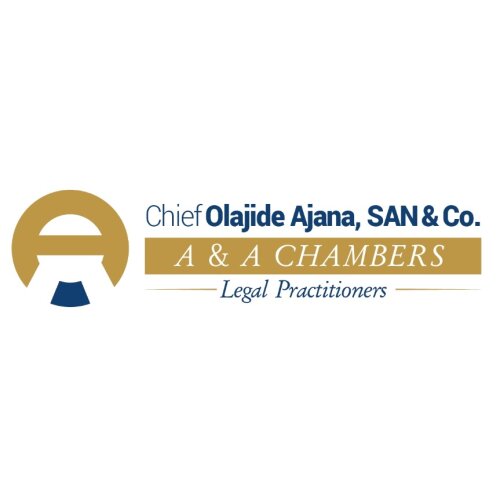Best Financial Services Regulation Lawyers in Akure
Share your needs with us, get contacted by law firms.
Free. Takes 2 min.
List of the best lawyers in Akure, Nigeria
About Financial Services Regulation Law in Akure, Nigeria
Financial services regulation in Akure, Nigeria, is part of the broader regulatory framework that governs the financial sector across the country. This includes regulations on banking, insurance, capital markets, and other financial services. The aim of these regulations is to ensure stability and integrity in the financial sector, protect consumers, and prevent financial crimes such as money laundering and fraud. The Central Bank of Nigeria (CBN), the Securities and Exchange Commission (SEC), and other regulatory bodies play pivotal roles in the enactment and enforcement of these regulations. In Akure, as in other parts of Nigeria, staying compliant with these regulations is crucial for all financial institutions and service providers.
Why You May Need a Lawyer
There are several situations where individuals and businesses in Akure may require legal assistance with financial services regulation. These include:
- Starting a financial service business and requiring guidance on licensing and compliance.
- Facing investigations or enforcement actions by regulatory bodies for alleged non-compliance.
- Needing assistance with understanding and implementing complex regulations and requirements.
- Dealing with disputes arising out of financial service transactions or contracts.
- Addressing issues related to consumer protection in financial services.
- Engaging in transactions that involve anti-money laundering law and need thorough compliance checks.
Local Laws Overview
In Akure, the key laws governing financial services are consistent with national legislation which includes:
- The Banks and Other Financial Institutions Act (BOFIA): This provides the framework for the establishment, regulation, and supervision of banks and other financial institutions.
- The Central Bank of Nigeria Act: Outlines the powers and responsibilities of the CBN as the principal regulatory authority.
- The Nigerian Deposit Insurance Corporation Act: Provides for the insurance of bank deposits and regulates the process of bank resolutions and liquidations.
- The Investment and Securities Act: Regulates the Nigerian capital market and provides for the establishment of the SEC.
- The Money Laundering (Prohibition) Act: Contains measures to curb money laundering and enforce transparency in financial transactions.
Frequently Asked Questions
What is the primary regulatory body for financial services in Nigeria?
The primary regulatory body for financial services in Nigeria is the Central Bank of Nigeria (CBN).
Do I need a license to operate a financial services business in Akure?
Yes, operating a financial services business requires licensing from the appropriate regulatory body such as the CBN or SEC, depending on the nature of the services offered.
What are the penalties for non-compliance with financial regulations?
Penalties may include fines, revocation of licenses, and legal action which could lead to imprisonment for severe violations.
How can I ensure compliance with anti-money laundering regulations?
Compliance can be ensured by implementing a robust internal control framework, conducting regular audits, training employees, and reporting suspicious transactions to the relevant authorities.
Can a lawyer help with regulatory compliance audits?
Yes, a lawyer with expertise in financial services regulation can provide legal advice and guidance during compliance audits.
Where do I report financial fraud in Akure?
Financial fraud can be reported to the Economic and Financial Crimes Commission (EFCC) or the Nigerian Police in Akure.
What consumer protections are available in financial services?
The Consumer Protection Framework outlines protections against unfair practices in the financial services sector, with oversight by the CBN's Consumer Protection Department.
Is digital currency regulated in Nigeria?
Yes, digital currencies and related activities are subject to regulations by the CBN, which has guidelines and restrictions in place for their use.
What is a typical process of resolving disputes in financial transactions?
Disputes are often resolved through negotiation, mediation, arbitration, or litigation, depending on the nature and complexity of the issue.
Can non-residents access financial services in Akure?
Yes, non-residents may access certain financial services, subject to foreign exchange regulations and approvals by the CBN.
Additional Resources
Several resources can be helpful for understanding financial services regulation in Akure:
- Central Bank of Nigeria (CBN): Offers regulatory guidelines and updates on financial regulations.
- Securities and Exchange Commission (SEC): Provides information and resources concerning capital markets regulation.
- Nigerian Deposit Insurance Corporation (NDIC): Helps understand deposit insurance and bank liquidation processes.
- Economic and Financial Crimes Commission (EFCC): Provides information on enforcement against financial crimes.
Next Steps
If you need legal assistance in financial services regulation in Akure, consider the following steps:
- Identify and consult with a lawyer or law firm specializing in financial services regulation.
- Gather all relevant documents and facts related to your legal issue or regulatory concern.
- Schedule a consultation to discuss your situation and understand potential strategies and solutions.
- Ensure clear communication with your legal advisor to effectively address all compliance or legal challenges.
Lawzana helps you find the best lawyers and law firms in Akure through a curated and pre-screened list of qualified legal professionals. Our platform offers rankings and detailed profiles of attorneys and law firms, allowing you to compare based on practice areas, including Financial Services Regulation, experience, and client feedback.
Each profile includes a description of the firm's areas of practice, client reviews, team members and partners, year of establishment, spoken languages, office locations, contact information, social media presence, and any published articles or resources. Most firms on our platform speak English and are experienced in both local and international legal matters.
Get a quote from top-rated law firms in Akure, Nigeria — quickly, securely, and without unnecessary hassle.
Disclaimer:
The information provided on this page is for general informational purposes only and does not constitute legal advice. While we strive to ensure the accuracy and relevance of the content, legal information may change over time, and interpretations of the law can vary. You should always consult with a qualified legal professional for advice specific to your situation.
We disclaim all liability for actions taken or not taken based on the content of this page. If you believe any information is incorrect or outdated, please contact us, and we will review and update it where appropriate.










